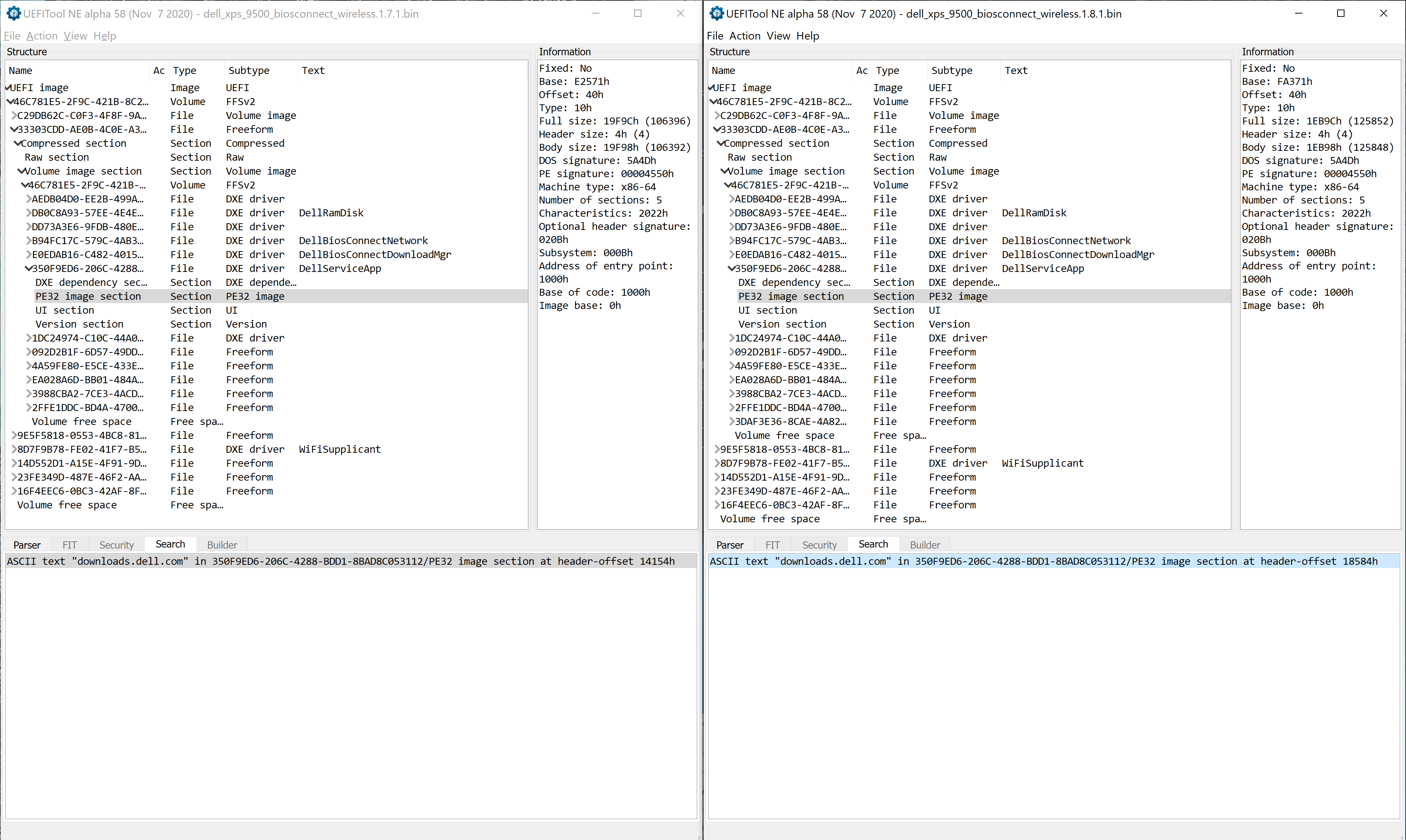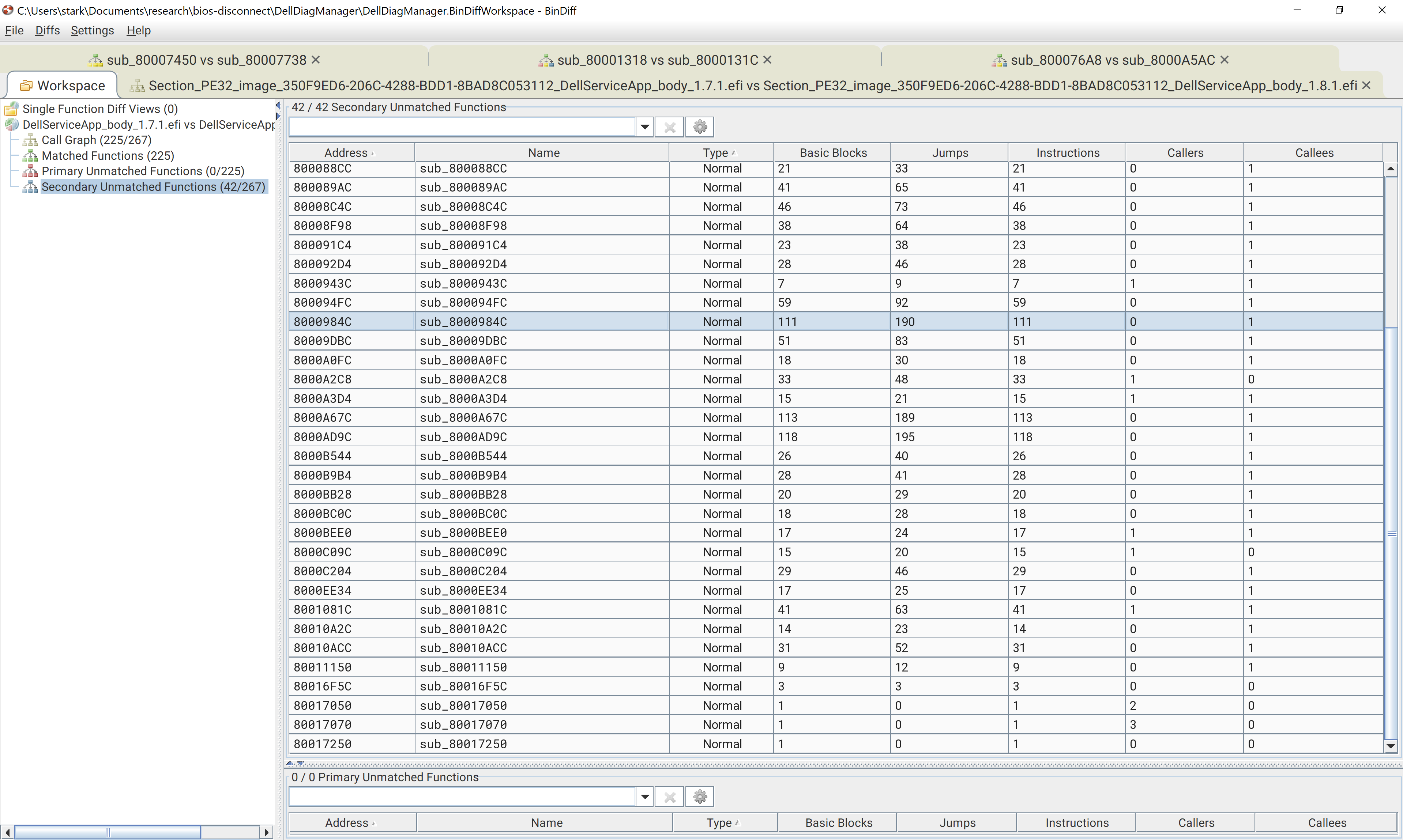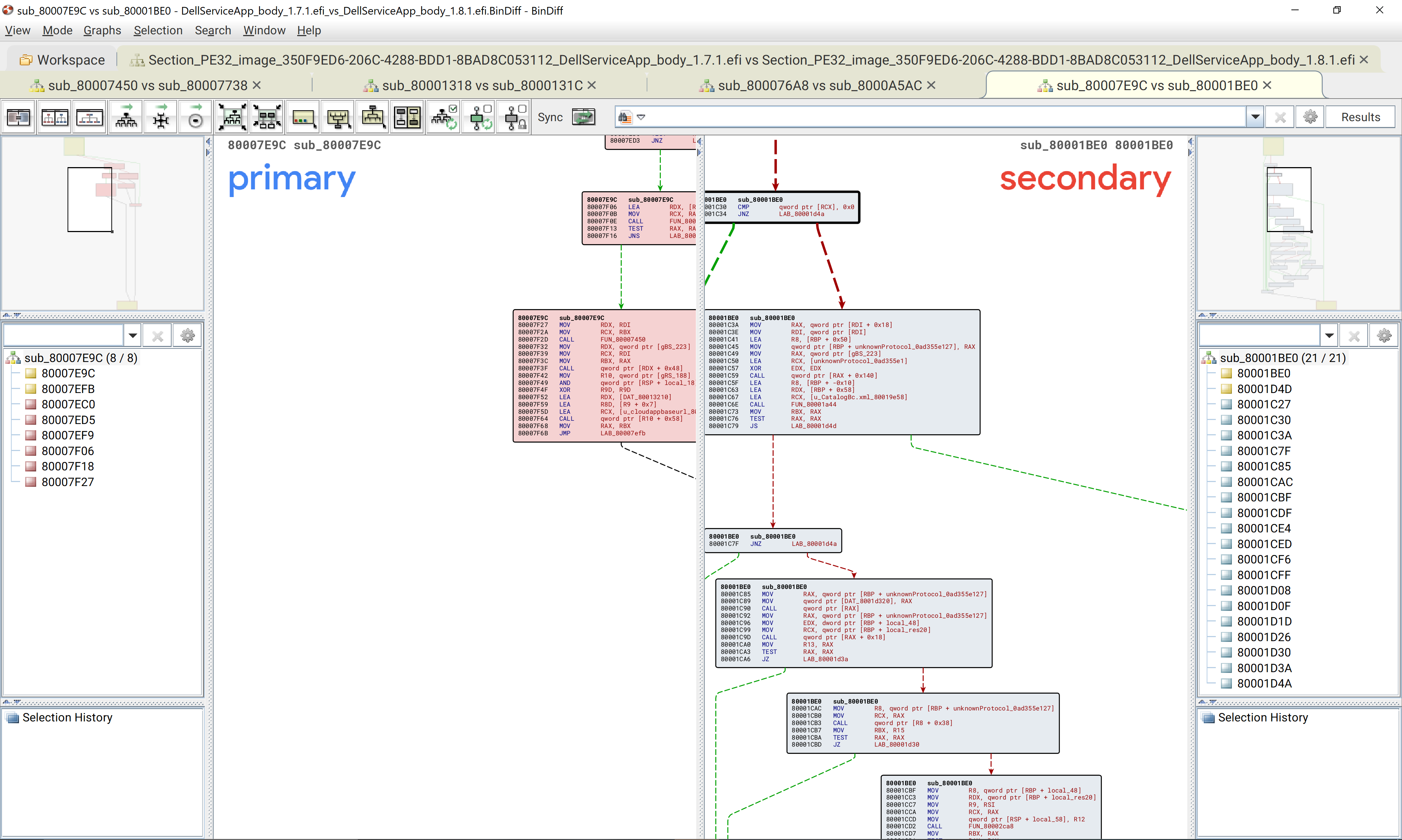BIOS Disconnect Vulnerability Diffing
Background
Recently Eclypsium announced the “BIOS Disconnect” vulnerabilities. These are four previously unknown vulnerabilities in the BIOSConnect capability embedded in the UEFI implementation of newer Dell hosts. Read more about it here:
https://eclypsium.com/2021/06/24/biosdisconnect/
and here:
Note that I was not involved in any way in the discovery of these vulnerabilities and full credit is due to the researchers at Eclypsium
The biggest flaw, and the flaw that enabled the other three vulnerabilities to be exploited, was the lack of hostname validation when retrieiving firmware metadata from vendor-controlled servers. Any valid TLS cert, albeit with a different hostname, would be excepted in vulnerable versions of the firmware.
Intent
The intent of this article is to examine the vendor provided fixes for the “BIOS Disconnect” vulnerabilities. We will use a suite of tools to manipulate the firmware images, search them, and look at the differences. This article only focuses on only one of the four discovered vulnerabilities.
On a Dell XPS 9500, the fixed firmware version was 1.8.1 and the last vulnerable version was 1.7.1.
1.8.1- https://dl.dell.com/FOLDER07401752M/1/XPS_9500_1.8.1.exe1.7.1- https://dl.dell.com/FOLDER07196164M/1/XPS_9500_1.7.1.exe
Note that these are windows-based executables for launching the UEFI updates downloaded directly from the vendor. They contain the actual UEFI implementation binary images within themselves. We will need to use a tool to extract the UEFI image from these .exe installer files.
Extraction
We will use this script to extract the firmware images from the installers:
Grab that script and run it against each of the .exe files:
$ python3 Dell_PFS_Extract.py XPS_9500_1.7.1.exe
$ python3 Dell_PFS_Extract.py XPS_9500_1.8.1.exe
This will create two directories with various firmware-related binary images in it:
XPS_9500_1.8.1.exe_extracted
XPS_9500_1.7.1.exe_extracted
The contents of these directories will look like this:
$ ls XPS_9500_1.8.1.exe_extracted/
'1 -- 1 System BIOS with BiosGuard v1.8.1.bin' '1 -- 15 BiosConnect Core FV v1.19.5.bin' '1 -- 5 Integrated Sensor Hub PDT Data v0.0.0.2.bin'
'1 -- 10 Embedded Controller v1.0.7.bin' '1 -- 16 BiosConnect Wireless FV v1.19.5.bin' '1 -- 6 Main System Cypress Port Controller 0 v1.12.64.50.bin'
'1 -- 11 Backup Embedded Controller v1.0.5.bin' '1 -- 17 Model Information v1.0.0.0.txt' '1 -- 7 Main System Cypress Port Controller 1 v1.10.64.30.bin'
'1 -- 12 Cypress MCU FW v71.61.11.1.bin' '1 -- 2 Intel Management Engine Corporate Firmware Update v14.1.53.1649.bin' '1 -- 8 Embedded Controller v1.0.7.bin'
'1 -- 13 PCR0 XML v0.0.0.1.xml' '1 -- 3 Intel Management Engine Consumer Firmware Update v14.1.53.1649.bin' '1 -- 9 Backup Embedded Controller v1.0.5.bin'
'1 -- 1 System BIOS with BiosGuard v1.8.1.bin' is the file I started with. I also tried '1 -- 15 BiosConnect Core FV v1.19.5.bin' and then '1 -- 16 BiosConnect Wireless FV v1.19.5.bin'. The latter turned out to contain the code responsible for the vulnerability.
Searching
Next we need to find the specific UEFI module that contains the code in question. This is a difficult task because we don’t know exactly what to look for. Also, Ghidra does not have indexing capabilities for entire firmware images as far as I know. The easiest way to search these binaries for strings is by using UEFITool.
Open up UEFITool and load each firmware image into different UEFITool windows. Then hit CTRL+F to search the UEFI image for strings. If there is a match, UEFITool will report the location of the string in terms of UEFI modules. That way we can hone in on a few modules, searching by keywords, to begin our quest for finding the proper UEFI module that handles the functionality in question.
A few notes on searching: I usually try to search with Unicode enabled and disabled. Sometimes strings in UEFI implementations are unicode; some times they are ASCII. Searching for both will often yield results you wouldn’t otherwise see. Also, I usually search with case sensitivity disabled, unless I really know what I am looking for.
The original PDF writeup mentions a few clues to help use narrow our search:
The process of verifying the certificate for dell.com is done by first retrieving the DNS record from the hard-coded server 8.8.8.8 (Google) then establishing a connection to https://downloads.dell.com
We want to search for https://downloads.dell.com using UEFI Tool in the '1 -- 16 BiosConnect Wireless FV v1.19.5.bin' file. I also searched for 8.8.8.8.
The results for these searches, which were the same for both firmware images, are listed below:
ASCII text "downloads.dell.com" in 350F9ED6-206C-4288-BDD1-8BAD8C053112/PE32 image section at header-offset 14154h
ASCII text "8.8.8.8" in B94FC17C-579C-4AB3-BA28-678D1813D1D6/PE32 image section at header-offset 16CB4h
ASCII text "8.8.8.8" in 350F9ED6-206C-4288-BDD1-8BAD8C053112/PE32 image section at header-offset 14314h
The strings downloads.dell.com and 8.8.8.8 appear in a DXE Driver named DellServiceApp. 8.8.8.8 also appears in another DXE Driver named DellBiosConnectNetwork. First lets look at DellServiceApp. I right click on the corresponding entry in the UEFITool mainview and select Export Body for each version. Next I load both PE32 files into Ghidra and perform the autoanalysis, including with efiSeek analysis enabled. By looking up the downloads.dell.com string address in Ghidra, I learn that the string exists in the function at address 0x80001318 (1.7.1) and 0x8000131c (1.8.1). This tells me I have the right DXE driver to reverse engineer.
Finding the fix
Using Ghidra, I looked through the strings in the DellServiceApp for version 1.8.1 and ended up seeing this:
"Failed to verify URL."
This looks like a promising string to take a look at. The whole function looks like this:
EFI_STATUS
verify_url(char *param_1,char *param_2,ulonglong param_3,longlong *param_4,byte **param_5,
longlong *param_6)
{
char **ppcVar1;
ulonglong *puVar2;
ulonglong uVar3;
byte **ppbVar4;
longlong *plVar5;
int iVar6;
char cVar7;
EFI_STATUS EVar8;
undefined8 uVar9;
ulonglong uVar10;
char *pcVar11;
char *pcVar12;
longlong lVar13;
ulonglong uVar14;
longlong *local_res20;
undefined4 local_498;
int local_494 [3];
ulonglong local_488;
ulonglong local_480;
ulonglong local_478;
INT64 *unknownProtocol_0ad355e121;
INT64 *unknownProtocol_92fd000918;
ulonglong local_458;
ulonglong local_450;
longlong local_448;
undefined8 local_438;
undefined8 local_338;
char local_13a [258];
local_338._0_1_ = 0;
local_res20 = param_4;
FUN_80016fd4((undefined *)((longlong)&local_338 + 1),0,0x2fc);
local_438._0_1_ = 0;
FUN_80016fd4((undefined *)((longlong)&local_438 + 1),0,0xfe);
local_498 = 0;
unknownProtocol_0ad355e121 = (INT64 *)0x0;
unknownProtocol_92fd000918 = (INT64 *)0x0;
local_494[0] = 0;
FUN_80017070((undefined *)&local_338,0x2fd,0);
FUN_80017070((undefined *)&local_438,0xff,0);
EVar8 = (*gBS_223->LocateProtocol)
(&unknownProtocol_0ad355e1,(void *)0x0,&unknownProtocol_0ad355e121);
if ((longlong)EVar8 < 0) {
return EVar8;
}
if (unknownProtocol_0ad355e121 == (INT64 *)0x0) {
return EVar8;
}
EVar8 = FUN_8000943c((longlong)unknownProtocol_0ad355e121,param_2,(int)param_3,local_494);
iVar6 = local_494[0];
plVar5 = param_6;
ppbVar4 = param_5;
if ((longlong)EVar8 < 0) {
return 0x800000000000000e;
}
cVar7 = '\x02';
LAB_8000aea8:
do {
if (cVar7 == '\x02') {
EVar8 = (*gBS_223->LocateProtocol)
(&unknownProtocol_92fd0009,(void *)0x0,&unknownProtocol_92fd000918);
if ((longlong)EVar8 < 0) {
return EVar8;
}
if (unknownProtocol_92fd000918 == (INT64 *)0x0) {
return EVar8;
}
EVar8 = FUN_8000a0fc((longlong)unknownProtocol_0ad355e121,
(undefined **)unknownProtocol_92fd000918,param_2,param_3,ppbVar4);
if ((longlong)EVar8 < 0) {
if (iVar6 == 2) {
(**(code **)(*plVar5 + 0x40))(4,s_Failed_to_verify_URL._80019e78,&local_498);
if (*param_4 != 0) {
FUN_800086bc(&local_res20,(longlong **)¶m_5);
return EVar8;
}
return EVar8;
}
}
else {
if (iVar6 == 2) {
(**(code **)(*plVar5 + 0x50))();
}
}
if (iVar6 == 1) {
return EVar8;
}
if (iVar6 == 2) {
cVar7 = '\x03';
}
}
else {
if (cVar7 == '\x03') {
if (ppbVar4[8] != (byte *)0x0) {
(**(code **)(*plVar5 + 0x50))(s_Checking_cloud_SOS_Schema_versio_8001ada0);
puVar2 = (ulonglong *)ppbVar4[8];
local_488 = *puVar2;
local_480 = puVar2[1];
local_478 = puVar2[2];
if ((local_488 != 0) && (((1 < local_488 || (local_480 != 0)) || (local_478 != 0)))) {
uVar10 = 0;
uVar14 = uVar10;
if (puVar2[6] != 0) break;
goto LAB_8000b4c8;
}
(**(code **)(*plVar5 + 0x50))();
}
cVar7 = '\x04';
goto LAB_8000aea8;
}
if (cVar7 == '\x04') {
if ((param_4[2] != 0) && (pcVar11 = (char *)param_4[2], pcVar11 != (char *)0x0)) {
lVar13 = 0;
cVar7 = *pcVar11;
while (pcVar12 = pcVar11, cVar7 != '\0') {
lVar13 = lVar13 + 1;
cVar7 = pcVar11[lVar13];
}
while (((char *)(lVar13 + 1) != (char *)0x0 &&
(pcVar12 = FUN_80017050(pcVar12,(char *)(lVar13 + 1),'/'), pcVar12 != (char *)0x0))
) {
pcVar11[(int)pcVar12 - (int)pcVar11] = '\\';
pcVar12 = pcVar12 + 1;
lVar13 = 0;
cVar7 = *pcVar12;
while (cVar7 != '\0') {
lVar13 = lVar13 + 1;
cVar7 = pcVar12[lVar13];
}
}
}
cVar7 = '\x06';
goto LAB_8000aea8;
}
if (cVar7 == '\x06') {
ppcVar1 = (char **)ppbVar4[7];
uVar9 = FUN_80010a2c(*ppcVar1);
uVar14 = 0;
if ((char)uVar9 == '\0') {
(**(code **)(*plVar5 + 0x40))(4,s_Invalid_file_content_8001ae50,&local_498);
if (*(void **)ppbVar4[7] != (void *)0x0) {
(*gBS_223->FreePool)(*(void **)ppbVar4[7]);
}
if (*(void **)(ppbVar4[7] + 0x10) != (void *)0x0) {
(*gBS_223->FreePool)(*(void **)(ppbVar4[7] + 0x10));
}
if (*(void **)(ppbVar4[7] + 0x18) != (void *)0x0) {
(*gBS_223->FreePool)(*(void **)(ppbVar4[7] + 0x18));
}
}
else {
FUN_800081e0(ppcVar1[2]);
pcVar11 = *(char **)((longlong)ppbVar4[7] + 0x10);
uVar10 = uVar14;
if (pcVar11 != (char *)0x0) {
do {
if (pcVar11[uVar10] == '\0') break;
uVar10 = uVar10 + 1;
} while (uVar10 < 0x400);
if (1 < uVar10) {
do {
if (pcVar11[uVar14] == '\0') break;
uVar14 = uVar14 + 1;
} while (uVar14 < 0x400);
if ((pcVar11[uVar14 - 1] != '/') && (*pcVar11 != '.')) {
if (param_1 == (char *)0x0) {
EVar8 = 0x8000000000000002;
}
else {
EVar8 = FUN_80008f98(param_1,*(char **)ppbVar4[7],&local_438);
}
if ((longlong)EVar8 < 0) {
return EVar8;
}
EVar8 = FUN_80010acc(&local_438,&local_338);
if ((longlong)EVar8 < 0) {
return EVar8;
}
pcVar12 = s_cacert.pem_8001ae68;
pcVar11 = local_13a;
cVar7 = local_13a[0];
while ((cVar7 != '\0' && (cVar7 == *pcVar12))) {
pcVar11 = pcVar11 + 1;
pcVar12 = pcVar12 + 1;
cVar7 = *pcVar11;
}
if (*pcVar11 == *pcVar12) {
(**(code **)(*plVar5 + 0x50))(s_Verifying_file_signature_8001ab08);
uVar14 = FUN_8001081c((longlong)unknownProtocol_92fd000918,
*(char **)(ppbVar4[7] + 0x10),
*(longlong *)(ppbVar4[7] + 0x18));
if ((longlong)uVar14 < 0) {
(**(code **)(*plVar5 + 0x40))(4,s_Failed_to_verify_file._8001ae78,&local_498);
return uVar14;
}
(**(code **)(*plVar5 + 0x50))(s_File_signature_verified_8001ab28);
DAT_8001d30b = 1;
EVar8 = FUN_80008238(plVar5[6],*(char **)(ppbVar4[7] + 0x10),
*(longlong *)(ppbVar4[7] + 0x18));
if ((longlong)EVar8 < 0) {
(**(code **)(*plVar5 + 0x40))(4,s_Failed_to_verify_file._8001ae78,&local_498);
return EVar8;
}
}
FUN_80017070((undefined *)&local_438,0xff,0);
FUN_80017070((undefined *)&local_338,0x2fd,0);
cVar7 = '\a';
goto LAB_8000aea8;
}
}
}
(**(code **)(*plVar5 + 0x40))(4,s_Invalid_file_content_8001ae50,&local_498);
if (*(void **)ppbVar4[7] != (void *)0x0) {
(*gBS_223->FreePool)(*(void **)ppbVar4[7]);
}
if (*(void **)(ppbVar4[7] + 0x10) != (void *)0x0) {
(*gBS_223->FreePool)(*(void **)(ppbVar4[7] + 0x10));
}
if (*(void **)(ppbVar4[7] + 0x18) != (void *)0x0) {
(*gBS_223->FreePool)(*(void **)(ppbVar4[7] + 0x18));
}
}
ppbVar4[7] = (byte *)0x0;
return 0x8000000000000002;
}
if (cVar7 == '\a') {
uVar14 = 0;
if (param_4[3] == 0) {
return EVar8;
}
lVar13 = 0;
goto LAB_8000aedf;
}
}
if (cVar7 == '\t') {
return EVar8;
}
} while( true );
LAB_8000b440:
uVar3 = puVar2[7];
local_458 = *(ulonglong *)(uVar3 + uVar10);
local_450 = *(ulonglong *)(uVar3 + 8 + uVar10);
local_448 = *(longlong *)(uVar3 + 0x10 + uVar10);
if (((local_458 != 0) && (local_458 < 2)) && ((local_450 == 0 && (local_448 == 0)))) {
(**(code **)(*plVar5 + 0x50))(s_Downloading_compatible_cloud_SOS_8001ae00);
lVar13 = uVar14 * 0x118 + 0x18 + *(longlong *)(ppbVar4[8] + 0x38);
LAB_8000b511:
uVar14 = maybe_download(plVar5,lVar13);
return uVar14;
}
local_488 = *(ulonglong *)(uVar3 + uVar10);
local_478 = *(ulonglong *)(uVar3 + 0x10 + uVar10);
local_480 = local_450;
if (((local_488 > DAT_8001d378 || DAT_8001d378 == local_488) && (local_488 <= DAT_8001d378)) &&
((local_450 > DAT_8001d380 || DAT_8001d380 == local_450 &&
(((local_450 <= DAT_8001d380 && (local_478 > DAT_8001d388 || DAT_8001d388 == local_478)) &&
(local_478 <= DAT_8001d388)))))) {
(**(code **)(*plVar5 + 0x50))(s_Downloading_compatible_cloud_SOS_8001ae00);
lVar13 = uVar14 * 0x118 + 0x18 + *(longlong *)(ppbVar4[8] + 0x38);
goto LAB_8000b511;
}
uVar14 = uVar14 + 1;
uVar10 = uVar10 + 0x118;
if (puVar2[6] <= uVar14) {
LAB_8000b4c8:
(**(code **)(*plVar5 + 0x40))(4,s_Compatible_cloud_SOS_not_found_8001ae30,&local_498);
return 0x8000000000000002;
}
goto LAB_8000b440;
LAB_8000aedf:
uVar9 = FUN_80010a2c(*(char **)(lVar13 + *param_4));
if ((char)uVar9 == '\0') {
(**(code **)(*plVar5 + 0x40))(4,s_Invalid_file_content_8001ae50,&local_498);
FUN_800086bc(&local_res20,(longlong **)¶m_5);
EVar8 = 0x8000000000000002;
param_4 = local_res20;
}
FUN_800081e0(*(char **)(lVar13 + 0x10 + *param_4));
pcVar11 = *(char **)(lVar13 + 0x10 + *param_4);
if (pcVar11 == (char *)0x0) {
LAB_8000b2cb:
(**(code **)(*plVar5 + 0x40))(4,s_Invalid_file_content_8001ae50,&local_498);
FUN_800086bc(&local_res20,(longlong **)¶m_5);
EVar8 = 0x8000000000000002;
param_4 = local_res20;
}
else {
uVar10 = 0;
do {
if (pcVar11[uVar10] == '\0') break;
uVar10 = uVar10 + 1;
} while (uVar10 < 0x400);
if (uVar10 < 2) goto LAB_8000b2cb;
uVar10 = 0;
do {
if (pcVar11[uVar10] == '\0') break;
uVar10 = uVar10 + 1;
} while (uVar10 < 0x400);
if ((pcVar11[uVar10 - 1] == '/') || (*pcVar11 == '.')) goto LAB_8000b2cb;
}
if ((longlong)EVar8 < 0) {
return EVar8;
}
uVar14 = uVar14 + 1;
lVar13 = lVar13 + 0x28;
if ((ulonglong)param_4[3] <= uVar14) {
return EVar8;
}
goto LAB_8000aedf;
}
This function exists at 0x8000AD9C in 1.8.1.
This looks like a function that validates URLs. A few more interesting details about this function include it seems to have a file signing check implemented, so perhaps the vendor added something like an HMAC to the metadata file for verification. It also looks like this function references the CA-cert bundle for hostname verification.
The big test is though if this function exists within the 1.7.1 image. If no corresponding code is found in 1.7.1 then the aforementioned function is more likely to be part of the fix. Using bindiff, we see that the function at this address is unmatched in version 1.7.1.
I am confident the new function represents the bulk of the verification that fixes this vulnerability. The new function is called through an intermediary function from the function at 0x80007e9c (1.7.1) and 0x80001be0 (1.8.1). This function exists in both images and changes significantly from 1.7.1 to 1.8.1.


